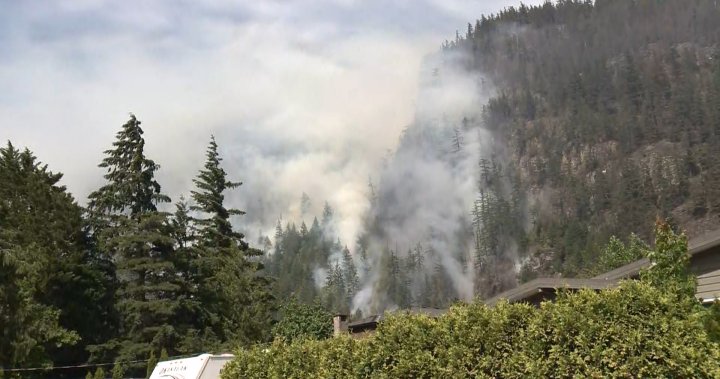As afternoon descended on Squamish yesterday, what began as a typical spring day quickly turned into a crisis for hundreds of residents near Alice Lake Provincial Park. The sudden evacuation order, triggered by a rapidly expanding wildfire, sent families scrambling for safety while emergency crews mobilized across the region.
“I was just finishing lunch when I got the alert,” says Marlene Kowalski, who has lived near Alice Lake for over a decade. “Within twenty minutes, we had thrown whatever we could into the car and were heading south. You could already see the smoke building over the treeline.”
The wildfire, first reported around 1:30 PM Thursday, grew from approximately two hectares to more than fifteen within hours, according to the BC Wildfire Service. Officials cite unusually dry spring conditions and moderate winds as factors in its rapid expansion.
The District of Squamish Emergency Operations Centre issued a formal evacuation order covering all of Alice Lake Provincial Park, the adjacent campgrounds, and residential areas within three kilometers of the fire’s edge. This affects roughly 350 properties and an estimated 800-900 residents and visitors.
Squamish Mayor Armand Hurford addressed concerned citizens at a hastily arranged press briefing: “Our priority remains the safety of residents and the protection of homes. We’re working closely with provincial resources and have mutual aid agreements activated with neighboring fire departments.”
The evacuation order comes distressingly early in what experts predict could be another challenging wildfire season for British Columbia. Last year’s provincial wildfire statistics showed a 15% increase in early spring fires compared to the five-year average, according to data from the Ministry of Forests.
At the Brennan Park Recreation Centre, which has been converted into an emergency reception area, volunteers from the Red Cross and local community groups are processing evacuees and arranging temporary accommodations.
“We’ve seen about 200 people come through already,” notes reception centre coordinator Lisa Pedrini. “Most have friends or family they can stay with, but we’re arranging hotel rooms for those who need them. The community response has been tremendous.”
BC Wildfire Service has deployed three initial attack crews, supported by water bombers and helicopters with buckets. The challenging terrain around Alice Lake—steep in sections with mixed forest coverage—has complicated firefighting efforts.
“This fire is displaying rank three behavior with visible flames and moderate rates of spread,” explains forestry technician Marcus Wong, who serves as a public information officer with the BC Wildfire Service. “Given the time of year, that’s concerning.”
What makes the Alice Lake wildfire particularly troubling is its timing. Spring wildfires were once relatively uncommon in coastal British Columbia, but climate researchers at the University of British Columbia have documented shifting patterns over the past decade.
Dr. Sarah Johnstone, climate scientist at UBC’s Department of Earth, Ocean and Atmospheric Sciences, notes this trend in her recent research: “We’re seeing earlier snow melt, extended dry periods in spring, and generally more volatile weather patterns that create ideal conditions for early-season fires.”
For evacuees like the Thompson family, who were camping at Alice Lake when the evacuation was announced, the experience was jarring. “We were planning three days of hiking and fishing,” says Michael Thompson, who traveled from North Vancouver with his wife and two children. “Instead, we’re in a high school gym wondering if we’ll ever see our camping gear again.”
Highway 99, the main route connecting Squamish to Vancouver, remains open but with reduced speed limits near the fire zone. RCMP officers are stationed at key intersections to prevent unauthorized entry into evacuation zones and to manage traffic flow.
Local businesses have stepped up to support displaced residents. The Squamish Brewing Company has offered its facility as a donation collection point, while several restaurants are providing free meals to evacuees who present their emergency registration papers.
“This is what community looks like,” says Jen Ramsay, owner of Cloudburst Café, who has been delivering coffee and pastries to emergency workers. “When things get tough, Squamish pulls together.”
Provincial officials have indicated that additional resources are being mobilized, including specialized crews from Kamloops and Prince George. A provincial state of emergency has not been declared, but regional emergency operations have been elevated to level two response.
As night fell over Squamish, the orange glow visible from parts of downtown served as a stark reminder of the situation’s seriousness. Fire crews will work through the night with heavy equipment to establish control lines, though complete containment remains challenging given the current conditions.
For now, residents wait—some in emergency accommodations, others with friends—wondering when they might return home and what they’ll find when they do. The Alice Lake wildfire represents not just an immediate crisis, but perhaps a troubling preview of what could be another difficult wildfire season in British Columbia.
“We’ve been through floods, we’ve been through landslides,” reflects long-time resident Jim Carlson, watching the smoke from a viewpoint near downtown. “But seeing a wildfire this close to town, this early in the year—that’s something new altogether.”






